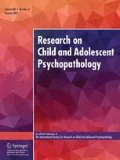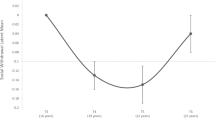Abstract
Children identified as low-frequency interactors or socially withdrawn were compared to outgoing children to evaluate whether socially withdrawn children display concurrent internalizing problems. From a sample of 640 children in grades 2–5, 48 children were identified by teachers as lowfrequency interactors and 72 children were selected as outgoing or sociable. When these two groups were compared on a battery of teacher, peer, and selfreport measures that assessed internalizing difficulties, the lowfrequency interactors were found to display concurrent problems in adjustment. Children who rarely interacted with peers were less well liked by their peers, displayed poorer self-concepts, and were more depressed and anxious than sociable children. In contrast to these findings regarding internalizing problems, the two groups did not differ on measures of externalizing problems. The results lend support to the concurrent validity of the low-interaction method of identifying socially withdrawn children.
Similar content being viewed by others
References
Allen, K. E., Hart, B., Buell, J. S., Harris, T. R., & Wolf, M. M. (1964). Effects of social reinforcement on isolate behavior of a nursery school child.Child Development, 35, 511–518.
American Psychiatric Association. (1980).Diagnostic and statistical manual of mental disorders (3rd ed.). Washington, D.C.: Author.
Asher, S. R., Markell, R. A., & Hymel, S. (1981). Identifying children at risk in peer relations: A critique of the rate-of-interaction approach to assessment.Child Development, 52, 1239–1245.
Bolstad, O. D., & Johnson, S. M. (1977). The relationship between teachers' assessment of students and the students' actual behavior in the classroom.Child Development, 48, 570–578.
Conger, J. C., & Keane, S. P. (1981). Social skills intervention in the treatment of isolated or withdrawn children.Psychological Bulletin, 90, 478–495.
Deluty, R. H. (1979). Children's Action Tendency Scale: A self-report measure of aggressiveness, assertiveness, and submissiveness in children.Journal of Consulting and Clinical Psychology, 47, 1061–1071.
Deutsch, F. (1974). Observational and sociometric measures of peer popularity and their relationship to egocentric communication in female preschoolers.Developmental Psychology, 10, 745–747.
Evers, W. L., & Schwarz, J. C. (1973). Modifying social withdrawal in preschoolers: The effects of filmed modeling and teacher praise.Journal of Abnormal Child Psychology, 1, 248–256.
Furman, W., Rahe, D. F., & Hartup, W. W. (1979). Rehabilitation of socially withdrawn preschool children through mixed-aged and same-aged socialization.Child Development, 50, 915–922.
Gottman, J. M. (1977). Toward a definition of social isolation in children.Child Development, 50, 915–922.
Green, K. D., Vosk, B., Forehand, R., & Beck, S. (1981). An examination of differences among sociometrically identified accepted, rejected, and neglected children.Child Study Journal, 11, 117–124.
Green, K. D., Forehand, R., Beck, S. J., & Vosk, B. (1980). An assessment of the relationship among measures of children's social competence and children's academic achievement.Child Development, 51, 1149–1156.
Green, K. D., & Forehand, R. (1980). Assessment of children's social skills: A review of methods.Journal of Behavioral Assessment, 2, 143–159.
Greenwood, C. R., Walker, H. M., & Hops, H. (1977). Issues in social interaction withdrawal assessment.Exceptional Children, 43, 490–499.
Greenwood, C. R., Walker, H. M., Todd, N. M., & Hops, H. (1979). Selecting a cost-effective screening device for the assessment of preschool social withdrawal.Journal of Applied Behavior Analysis, 12, 639–652.
Hummel, T. J., & Sligo, J. R. (1971). Empirical comparison of univariate and multivariate analysis of variance procedures.Psychological Bulletin, 76, 49–57.
Kagan, J., & Moos, H. A. (1962).Birth to maturity: A study in psychological development. New York: Wiley.
Kohn, M. L., & Clausen, J. A. (1955). Social isolation and schizophrenia.American Sociological Review, 20, 265–273.
Kovacs, M. (1981). Rating scales to assess depression in school-aged children.Acta Paedopsychiatrica, 46, 305–315.
Kovacs, M. (1983).The Children's Depression Inventory: A self-rated depression scale for schoolaged youngsters. Unpublished manuscript, University of Pittsburgh School of Medicine.
Michael, C. M., Morris, D. P., & Soroker, E. (1957). Follow-up studies of shy, withdrawn children: II. Relative incidence of schizophrenia.American Journal of Orthopsychiatry, 27, 331–337.
Morris, D. P., Soroker, E., & Buruss, G. (1954). Follow-up studies of shy, withdrawn children: I. Evaluation of later adjustment.American Journal of Orthopsychiatry, 24, 743–754.
O'Connor, R. D. (1969). Modification of social withdrawal through symbolic modeling.Journal of Applied Behavior Analysis, 2, 15–22.
O'Connor, R. D. (1972). Relative efficacy of modeling, shaping, and the combined procedures for modification of social withdrawal.Journal of Abnormal Psychology, 79, 327–334.
Oden, S., & Asher, S. R. (1977). Coaching children in social skills for friendship making.Child Development, 48, 495–506.
Piers, E. V., & Harris, D. B. (1964). Age and other correlates of self-concept in children.Journal of Educational Psychology, 55, 91–95.
Quay, H. C. (1979). Classification. In H. C. Quay & J. S. Werry (Eds.),Psychopathological disorders of childhood (2nd ed., pp. 1–42). New York: Wiley.
Quay, H. C., & Peterson, D. R. (1983).Interim manual for the Revised Behavior Problem Checklist. Coral Gables, Florida: University of Miami, Coral Gables.
Reynolds, C. R. (1982).Convergent and divergent validity of what I think and feel: The Revised Children's Manifest Anxiety Scale. Paper presented at the Annual Meeting of the American Psychological Association, Washington, D.C.
Reynolds, C. R., & Paget, K. D. (1983). National normative and reliability data for the Revised Children's Manifest Anxiety Scale.School Psychology Review, 12, 324–336.
Reynolds, C. R., & Richmond, B. O. (1978). What I think and feel: A revised measure of children's manifest anxiety.Journal of Abnormal Child psychology, 6, 271–280.
Rubin, K. H. (1985). Socially withdrawn children: An “at risk” population? In B. Schneider, K. H. Rubin, & J. Ledingham (Eds.),Children's peer relations: Issues in assessment and intervention (pp. 125–140). New York: Springer-Verlag.
Singleton, L. C., & Asher, S. R. (1977). Peer preferences and social interaction among thirdgrade children in an integrated school district.Journal of Educational Psychology, 69, 330–336.
Wanlass, R. L., & Prinz, R. J. (1982). Methodological issues in conceptualizing and treating childhood social isolation.Psychological Bulletin, 92, 39–55.
Author information
Authors and Affiliations
Additional information
The support of the Western Psychiatric Institute and Clinic's Clenical Research Center Grant #MH 30915 and the University of Georgia's Institute for Behavioral Research in the final preparation of this manuscript is gratefully acknowledged.
Rights and permissions
About this article
Cite this article
Strauss, C.C., Forehand, R., Smith, K. et al. The association between social withdrawal and internalizing problems of children. J Abnorm Child Psychol 14, 525–535 (1986). https://doi.org/10.1007/BF01260521
Revised:
Issue Date:
DOI: https://doi.org/10.1007/BF01260521




